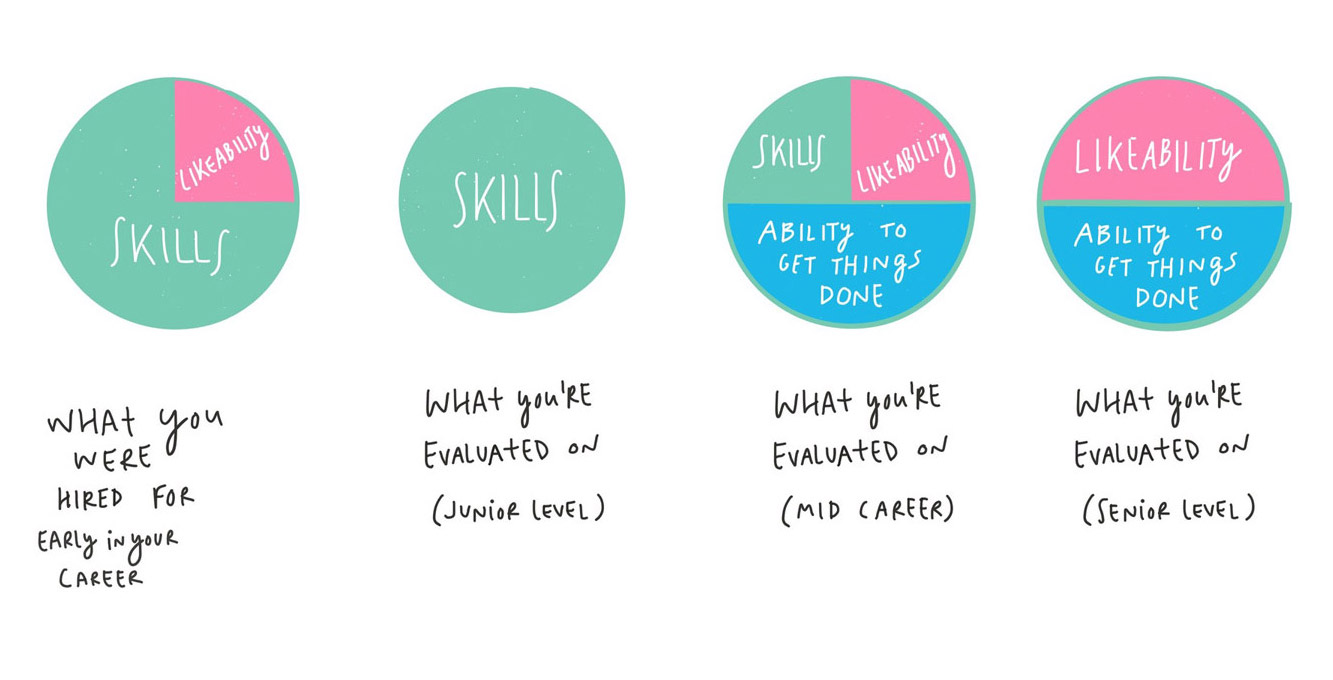At the start of your career, chances are good that you’ll be hired primarily for your “hard skills”—the stuff you know that’s relevant for the job. When you’re fresh out of college or even a few years into your career, things like what software you’ve mastered, the knowledge you’ve picked up during internships and in school, and your other technical credentials really matter.
But what no one quite tells you is that while you might’ve been initially hired for those hard skills, they gradually matter less. The further you get in your career, the less you’ll be evaluated on those same skills—and this is especially important once you reach your mid-career point. Why? Because the hard skills that got you the job won’t be the ones that get you promoted.

Now that’s not to say that improving your technical skills isn’t important. You should get better and faster at whatever your craft is over the course of your career, whether that’s coding, designing, researching, or something else. But if that’s the only area you improve in, you may find advancement more elusive than you’d expected. Improving your technical skills may be enough to get you promoted from level one to two, or coordinator to associate, but to advance higher, you’ll have to show improvement in other areas as well.
SHIFT TOWARD SOFT SKILLS . . .
So how do you do that? It starts with knowing what really counts when it comes to advancement at each stage of your career. While every role is different, the secret is to progressively invest more in your “soft skills”—your ability to get things done, your leadership abilities, and your likability at work (like it or not).
To get started—and no matter where you are in your present career—take a minute to assess where you stand in each of these categories:

The further you climb, the more decisive these traits will become. Maybe you have a few of them under your belt but could brush up on others. Now that you know what you’re up against, it’s time to take action. Here’s a game plan for growing your soft skills:
1. Self assess. Taking stock of your recent work and workplace habits, which areas do you feel strongest in? Weakest in? Which do you believe is most crucial to prioritize now, and why? Knowing the answers to these questions will be important for framing your conversation with your manager in the next step.
2. Discuss with your manager. Now it’s time to get on the same page. Work with your boss to determine what’s most important for you to learn now versus in the future: How much weight does your manager give to growing in these areas? And do you agree? What can you expect to happen when you show growth in these areas? Try to get specific about what you’re being evaluated on at each level. Your responsibilities may look different at various career stages, so make sure you understand any internal “career ladders” available to you, and how these map to your strengths and areas of development.
3. Explore ways of growing these softer skills in your current job. And that growth may be closer at hand than you think. What opportunities for collaboration and leadership might already exist? What are some avenues for taking on more responsibility in these areas? Brainstorm opportunities and check in with your manager on them. You’ll want her support to take on new things, and to keep an eye on the progress you’re making.
. . . WITHOUT LOSING SIGHT OF THE HARD ONES
What if your manager says you still need to improve your technical skills?
If you find that your manager is focusing on the technical skills even while you’re trying to bulk up on soft ones, this could mean two things: Either you’re still at junior level and need to grow in the basics (which is normal at the beginning of your career), or, if you’re mid-career and still getting this feedback, you may be at a company that values technical skills over people skills when it comes to promotions.
If that’s the case, you might find that the higher you go in a company like that, the less you enjoy the people who surround you. Consider whether that view (and company!) is a good match for you. Perhaps you’d be better off finding a different company that values your soft skills as much as you do.
Thank you: XIMENA VENGOECHEA

